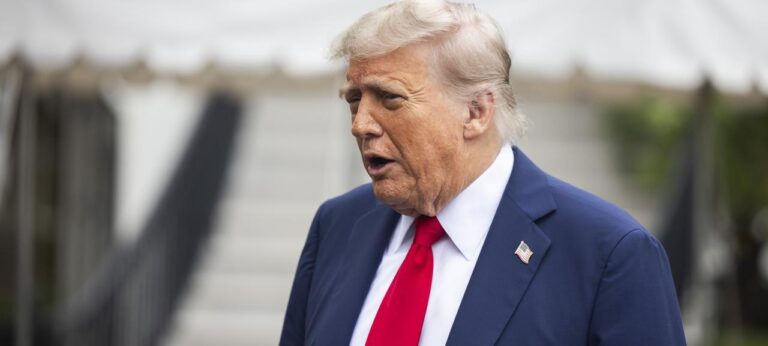Former U.S. President Donald Trump has asserted that Spain will be required to increase its financial contributions in upcoming trade negotiations, following the country’s failure to meet NATO defense spending targets. Speaking ahead of trade discussions, Trump emphasized the need for Spain to boost its military expenditure, linking defense commitments to economic agreements. This development adds a new dimension to U.S.-Spain relations amid ongoing debates over burden-sharing within the NATO alliance.
Trump Criticizes Spain Over NATO Defense Spending Shortfall Amid Trade Negotiations
Former President Donald Trump has publicly chastised Spain for its failure to meet the NATO guideline of spending 2% of GDP on defense. Speaking amid ongoing trade negotiations, Trump asserted that Spain’s reluctance to increase defense expenditure could lead to more stringent terms in the upcoming trade deal with the United States. He emphasized the importance of burden-sharing among NATO allies, suggesting that financial responsibilities should directly influence bilateral economic arrangements.
Key points in the dispute include:
- Spain currently spends approximately 1.2% of its GDP on defense, well below NATO targets.
- The U.S. administration is pressing for increased military contributions as a condition for trade concessions.
- Trade discussions encompass tariffs, market access, and investment protections beyond defense concerns.
| Country | Current Defense Spending (% GDP) | NATO Target (% GDP) |
|---|---|---|
| Spain | 1.2% | 2.0% |
| United States | 3.5% | 2.0% |
| Germany | 1.4% | 2.0% |
Implications for US-Spain Trade Relations as Washington Pushes for Increased Contributions
Washington’s recent insistence on increased contributions from Spain reflects a broader push by the US administration to enforce NATO defense spending commitments more rigorously. Following Spain’s reluctance to meet the 2% of GDP defense spending target, President Trump publicly declared that Spain would face greater financial obligations in forthcoming trade agreements. This stance signals a shift towards leveraging trade negotiations as a tool for defense policy enforcement, potentially complicating diplomatic relations between the two nations. Spain’s government, meanwhile, remains cautious about balancing domestic budget constraints with alliance expectations, leading to heightened uncertainty in bilateral trade discussions.
Trade analysts highlight a few immediate effects this development could have on US-Spain relations:
- Tariff adjustments: Potential increases in tariffs on Spanish exports as leverage for defense spending compliance.
- Investment scrutiny: Stricter review of Spanish investments in US sectors sensitive to national security concerns.
- Negotiation leverage: US may demand offsetting financial or strategic concessions in future trade deals.
| Aspect | US Position | Spain’s Potential Response |
|---|---|---|
| Defense Spending | Enforce 2% GDP target | Gradual increase, budget-dependent |
| Trade Tariffs | Possible hikes on key sectors | Seek exemptions or retaliatory measures |
| Investment | Enhanced security reviews | Redirect investments to less sensitive industries |
Experts Recommend Diplomatic Engagement to Resolve Defense Funding Disputes and Protect Economic Interests
As tensions rise over Spain’s refusal to meet NATO’s recommended defense spending targets, analysts emphasize the importance of diplomatic engagement to address disputes surrounding defense funding without escalating trade frictions. Experts warn that adopting a confrontational stance could undermine not only alliance cohesion but also broader economic interests shared between the United States and Spain. Constructive dialogue, they argue, is key to harmonizing security commitments with sustainable trade relations.
Beyond defense spending, Spain’s economic ties with the U.S. remain strong but precarious, necessitating a balanced approach to prevent retaliatory measures that might affect critical industries. The recommended path involves:
- Prioritizing bilateral negotiations to clarify expectations on defense contributions
- Establishing joint economic forums to safeguard trade routes and investment flows
- Monitoring developments through periodic reviews to avoid sudden policy shifts
| Area | Potential Impact | Recommended Action |
|---|---|---|
| Defense Spending | Alliance strain | Facilitate dialogue |
| Trade Relations | Tariff increases | Economic cooperation |
| Investment Climate | Uncertainty | Regular assessments |
The Way Forward
As negotiations continue, the evolving dynamics between the United States and Spain underscore the broader challenges within NATO concerning defense spending commitments. President Trump’s remarks signal a potential shift in trade relations, linking economic agreements to military expenditure targets. Observers will be watching closely to see how these developments affect both bilateral ties and the unity of the transatlantic alliance moving forward.




